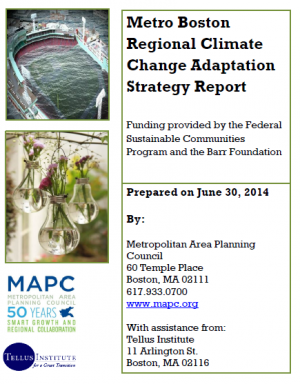June 2014
Prepared by the Metropolitan Area Planning Council with assistance from the Tellus Institute
Given the magnitude of climate change impacts on the natural environment, development and infrastructure, economy, and public health in the region; it is imperative that climate change adaptation is adequately addressed at the Regional Level. The primary goal of this Strategy is to prepare recommendations for local, regional, and state action to reduce vulnerability to future hazards and impacts of climate change within Eastern Massachusetts. This Strategy builds upon findings of the Massachusetts Climate Change Adaptation Report, September 2011 and other pertinent publications developed to date.
The overarching public purpose of the Strategy is to reduce the impacts of climate change through effective risk management. The Strategy is intended as a proactive approach in response to the findings of the vulnerability assessment conducted for the Metro-Boston Region.
The document includes a vulnerability assessment, identified goals and objectives, and adaptation strategies for five major sectors: built environment and key infrastructure, coastal zone, natural resources and habitat, human health and welfare, and local economy and government.
Acknowledgements
This report was produced by the Metropolitan Area Planning Council. Technical assistance was provided by Martin Pillsbury, Environmental Director (Project Manager); Julie Conroy, Senior Environmental Planner (Primary Author); Sam Cleaves, Senior Regional Planner (Author); Bill Wang, GIS Analyst; and Barry Keppard, Public Health Division Manager; James Goldstein, Senior Fellow, Tellus Institute; and William Dougherty, President, Climate Change Research Group.
The Metro-Boston Regional Climate Change Adaptation Strategy (RCCAS) was undertaken with funds from the Federal Sustainable Communities Program and the Boston Barr Foundation. We wish to express our sincere gratitude to the Barr Foundation, the U.S. Department of Housing and Urban Development, and the U.S. Environmental Protection Agency for their support and funding of this effort. We would also like to thank the MAPC Officers for their continued support: Lynn Duncan, President; Keith Bergman, Vice President; Shirronda Almeida, Secretary; Taber Keally, Treasurer; Marc Draisen, Executive Director.
Special appreciation goes to the members of the RCCAS Advisory Committee for their continuous assistance and leadership. See the full report for everyone involved on the Committee.

